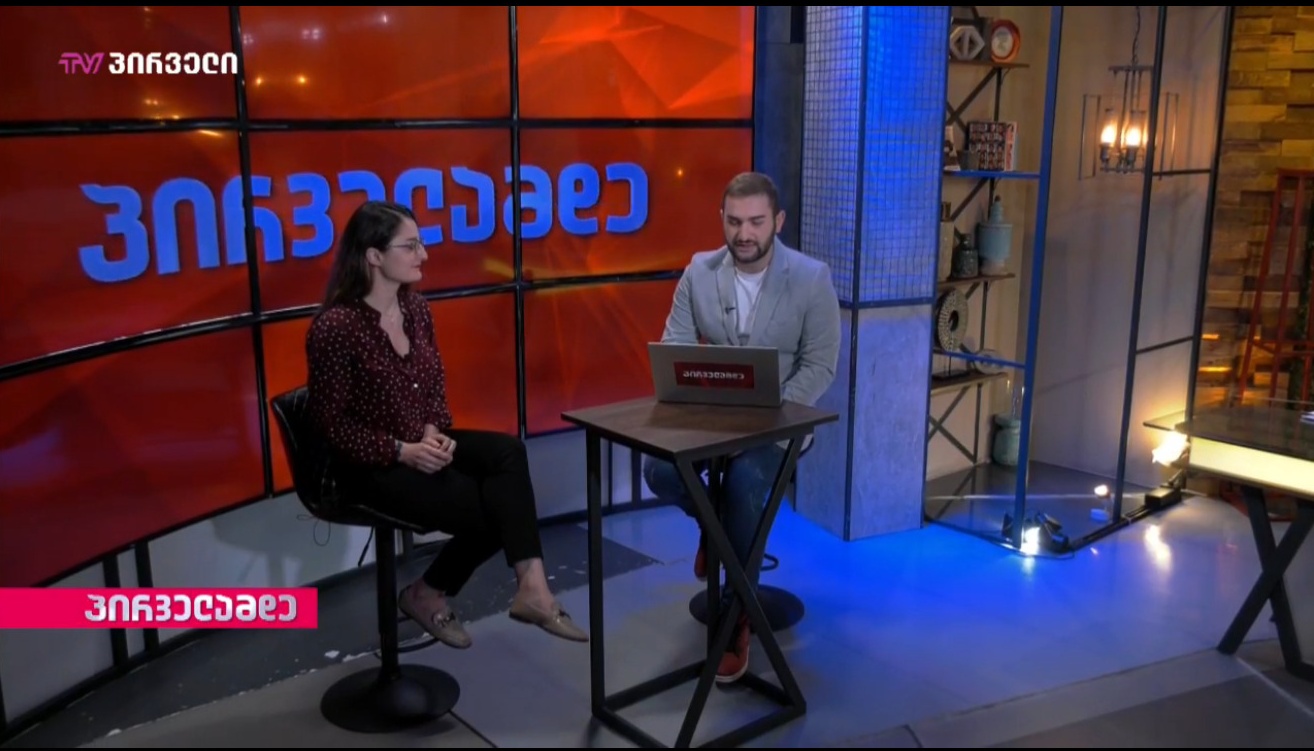Source: Facebook.com/watch/tvpirveli/
TV Pirelli Live Interview: „Youth passivity towards elections“ (Programme “Pirvelamde Nino Arazashviltan”)
On 30th of October, one day before the parliamentary elections in Georgia, TV Pirveli dedicated a special segment to political participation of youth within the “Pirvelamde Nino Arazashviltan” programme framework, which is a highly-ranked and widely-watched TV programme among Georgians. Based on the Caucasus Barometer 2019 data, 38% of Georgian citizens aged between 18-35 have not voted in the first stage of the 2018 presidential elections, compared to 42% at the second stage. According to the National Democratic Institute (NDI) 2019 survey, 46% of young people assume that none of the political parties represent their polito-economic or social views.
Supported by the NDI, the NGO “Women from Georgia” illustrated sceptical views of young people when it comes to their expectations from political parties and leaders. Among them was Nana Jikia, a student from Tbilisi, who spoke about the absence of a clear agenda on youth priorities and needs within political parties. The target audience of the vast majority of political parties is rather mass than individuals, which causes the problem of youth being ignored as a group with specific needs and concerns such as unemployment, lack of possibilities for students, unequal opportunities. As Nana mentioned, their personal freedom and development as well as professional aims and dreams are highly dependent on politics.
In order to further discuss low electoral participation among young people, Nino Samkharadze from the Georgian Institute of Politics (GIP), our project partner for #GEOYOUTH2020 – Manifesto Engaging Youth in Politics in Georgia, was invited to the live programme. Her blog article “Political Apathy in Georgia: Why Don’t Young People Vote?” (published recently as part of the project) served as a reference point for the discussion. To begin with, the journalist wanted to clarify the definition of “youth” itself, as different institutions define this age group differently: The Central Election Commission of Georgia counts young people aged 18-25, whereas other research institutions, including GIP, expand the upper limit to 35. As Nino Samlharadze explained, with this approach a wider range of challenges as well as their solutions can be addressed.
She differentiated structural and emotional obstacles that keep young people from participating in elections and political activities more broadly. While structural challenges, including ineffective intraparty systems or geographical factors like stark differences between the center and periphery are somewhat easier to resolve in a short term perspective, attitude barriers appear to be a more complex issue. As Nino Samkharadze evaluated, “young Georgians are in the process of forming their own political opinions, while also searching for an ideological worldview. They are the most undecided segment of society. Exactly therefore, the thick political wall made up of a polarized pre-electoral political environment, significantly personalized political processes, and clearly negative pre-electoral campaigns, impacts negatively on undecided youth and increases their apathetic and nihilistic outlook.”
As one solution in relation to political candidates, she suggests an increased number of younger politicians in the parliament, together with more youth oriented pre-electoral campaigns and more active knowledge of needs and expectations from your aged group. During the interview, Nino Samkharadze was asked to comment on the current CoViD-19 pandemic as an additional possible reason for not going to the ballot box. In her view, because youth is more up-to-date with quickly changing new information (in this case about CoViD), they might approach the election process itself with more responsibility – keeping safety measures and social distance even more seriously.
At the end of the talk, Nino Samkharadze underlined the significant role of creative messages that are directed towards youth electoral participation. Unlike in past elections, the 2020 pre-electoral campaigns addressed youth more directly, which she regards as a positive development. This shift towards more youth-friendly political campaigns can also be identified within political parties. Despite the above-mentioned challenges, Nino Samkharadze concluded her interview with optimistic remarks and noted that the elections are not only about one day but symbolise the responsibility of each citizen for the country’s nearest future and the legitimization of the next Georgian government.
Another interview has been published with Euronews Georgia, check it out here!
Project term
01 March- 31 December 2020
Our supporters
The project is funded by the German Federal Foreign Office in the framework of the programme “Expanding Cooperation with Civil Society in the Eastern Partnership Countries and Russia”.


